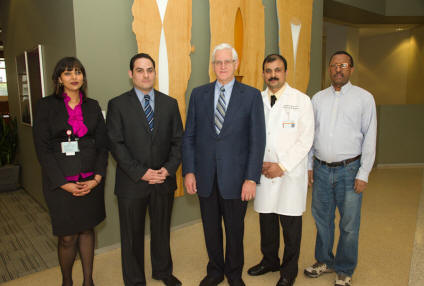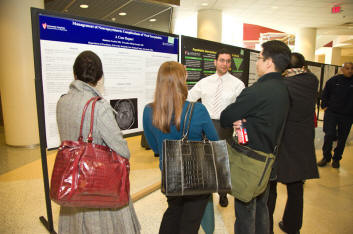Mentoring, Research and Scholarship
 The Neurology Residency Program has a comprehensive mentoring program. All residents have a faculty mentor to help guide them through the residency. Residents meet with their mentor several times a year to discuss career plans and other issues that arise through the year. In addition, residents choose a faculty research mentor to supervise them on a scholarship or research project during PGY3 and PGY4.
The Neurology Residency Program has a comprehensive mentoring program. All residents have a faculty mentor to help guide them through the residency. Residents meet with their mentor several times a year to discuss career plans and other issues that arise through the year. In addition, residents choose a faculty research mentor to supervise them on a scholarship or research project during PGY3 and PGY4.
Resident Research
The Neurology Residency Program offers a variety of research opportunities for residents, including:
- A flexible Residency Research Track
- Course work at the Case Clinical Research Scholars Program, including the popular CRSP summer course on "Introduction to Clinical Research"
- Resident Scholarship and Research Projects with attending supervision and mentorship
Each resident in our program participates in at least one scholarly or research activity during their residency. At the end of the PGY2 year each resident chooses a research mentor. This choice is based on the resident's clinical and research interests.
The department publishes an annual list of the clinical and basic science faculty, their research areas and specific research projects they are working on. In most cases, the mentor is a member of the primary neurology faculty, but occasionally this could be a different faculty member, for example, if the resident proposes to-do a basic science project. The role of the mentor will depend somewhat on the nature of the project to be performed.
With the research mentor, each resident will design a research project during their PGY3 to be completed by the spring of the PGY4 year. This project could range from a case report to a chart review to a small clinical or basic research project, but the emphasis will be on originality. The project will be presented during PGY4 as part of Resident Research Day.
Resident Research Day
 There is an annual research day each spring for residents to present their work, either as platform or poster presentation. The focus is on presentations by current neurology PGY4 residents, but other residents and fellows from neurosurgery, pediatric neurology, neuroradiology, psychiatry and graduate students from the Department of Neuroscience are encouraged to participate and present as well. The resident research day also includes a keynote address from a distinguished Case Alumnus of the neurology, neurosurgery or psychiatry programs. Awards are given to the resident(s) judged to have the best presentation.
There is an annual research day each spring for residents to present their work, either as platform or poster presentation. The focus is on presentations by current neurology PGY4 residents, but other residents and fellows from neurosurgery, pediatric neurology, neuroradiology, psychiatry and graduate students from the Department of Neuroscience are encouraged to participate and present as well. The resident research day also includes a keynote address from a distinguished Case Alumnus of the neurology, neurosurgery or psychiatry programs. Awards are given to the resident(s) judged to have the best presentation.
Neuroscience Research at Case
During the Neurology Residency Program at University Hospitals Cleveland Medical Center, in collaboration with Case Western Reserve University, residents are exposed to and may become involved in a large variety of active research projects and other opportunities within Neuroscience, which are ongoing within the University. Some highlights include:
StrokeNet
Five Cleveland biomedical research and healthcare institutions have received a $1 million grant from the National Institute of Neurological Disorders and Stroke (NINDS), one of the National Institutes of Health, to collaborate on developing the Cleveland Stroke Clinical Trials Regional Coordinating Center. Case Western Reserve University School of Medicine will administer the five-year grant through its Clinical Translational Science Collaborative (CTSC), an initiative that has secured $128 million to accelerate the progress of medical breakthroughs from research labs to patient care. Principal investigator on the Cleveland project is Anthony J. Furlan, MD, Professor of Neurology at Case Western Reserve University School of Medicine and UH Cleveland Medical Center. Dr. Furlan has extensive experience in the design and management of large stroke clinical trials. In the 1990s, he guided another collaborative stroke project in the city called Cleveland Operation Stroke, which piloted the American Stroke Association's Get with the Guidelines campaign and is now a national program that sets standards for hospital stroke care.
Sixteen pilot projects are funded related to memory and cognition ranging from prion protein misfolding to exercise therapy in Parkinson's disease and Alzheimer disease.
The Integrated Medical Environment™
There is a broad consensus that healthcare in the 21st century will require the intensive use of information technology to acquire and manage patient data, transform the data into actionable information, and then disseminate this information so that it can be effectively used to improve patient care. Nowhere is this more evident and more important than in the intensive care unit (ICU) where there are staggering amounts of data, beyond the capability of any person to absorb. The result is too much data and not enough information.
At University Hospitals Cleveland Medical Center and Case Western Reserve University, we have focused on solving this problem by developing the Integrated Medical Environment™ (tIME™), a new open-source architecture that we believe can provide the backbone for the ICU of the future. Specifically, tIME™ provides the following:
- A clinician-centric visual display and interface, to present an integrated overview of the patient state so that providers can make sensible decisions at the bedside
- Complex systems analysis and data mining for hypothesis generation and testing
- Real-time data acquisition, integration, time-synchronization, and data annotation of all physiological waveform data
Only when all of these components work in concert will we be able to fully harness the power of information technology to improve patient outcomes in the ICU.


